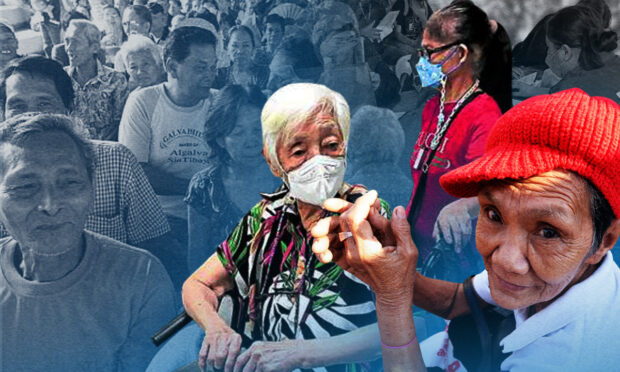
Composite image from Agence France-Presse photos
MANILA, Philippines — Senior Citizen Party-list Rep. Rodolfo Ordanes proposed on Sunday the assistance of telecommunications firms and other government agencies in finding Filipino elderly eligible for the cash payouts under the expanded Centenarian Law.
Ordanes said, “Asking the octogenarians and nonagenarians to register online would be an arduous task for these elderly who need assistance of relatives and caregivers to go online.”
He was referring to the Elderly Data Management System (EDMS) in which the National Commission of Senior Citizens (NCSC) has been calling on elderly Filipinos to register. The creation of the online database is intended to locate persons aged 80,85, 90, 95, and 100 who are eligible to receive cash under the expanded Centenarian Act (Republic Act No. 11982).
Under RA 11982, Filipino citizens who are 80, 85, 90, and 95 years old will receive P10,000 each, while those who reach 100 are entitled to P100,000. The law also tasks the NCSC to create the EDMS.
Ordanes pointed out he has “concerns on data privacy and security.”
“Whenever seniors have to share their data with other people because they are vulnerable to financial abuse, identity theft, fraud, and scams,” he said.
Use SIM data
“Perhaps the telecommunication companies can help NCSC safely, and with due respect and observance of rules on data privacy, locate or contact the eligible seniors because these ‘telcos’ have SIM (subscriber identity module) registration databases of everyone who uses a mobile phone,” he added.
He asked for the help of the National Privacy Commission and the National Telecommunications Commission.
READ: Elderly covered by Centenarian Act told: Register now, get paid in 2025
Ordanes added the Department of the Interior and Local Government, the Department of Social Welfare and Development, the Department of Health, the Social Security System, the Government Service Insurance System, the Philippine Statistics Authority, and the Philippine Veterans Affairs Office could also help facilitate the search for persons who are turning 80, 85, 90, and 95 this year.
He said several government agencies have their respective databases.
“Searching for the eligible seniors would be faster and more reliable if existing and verified databases are used,” he added.